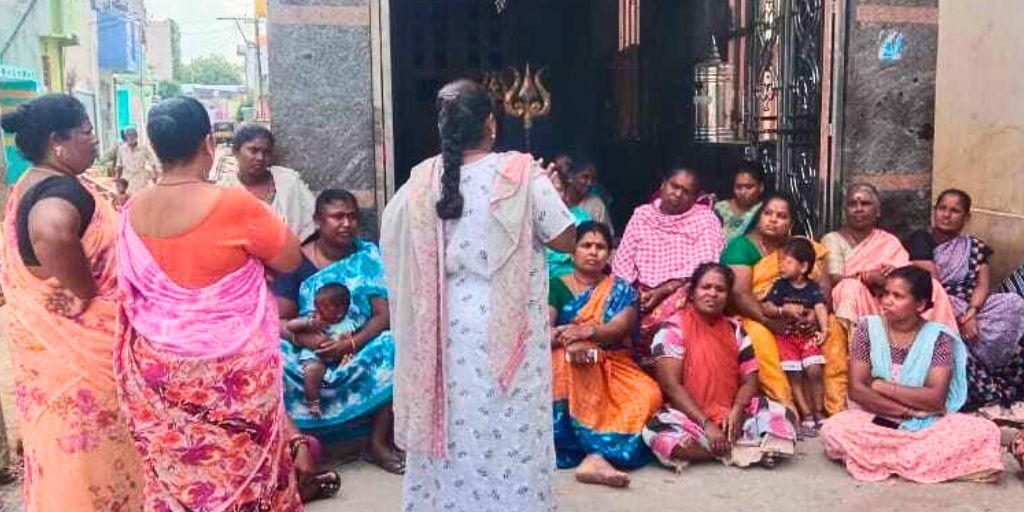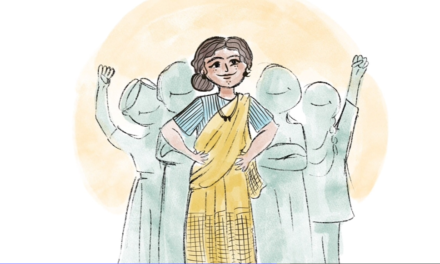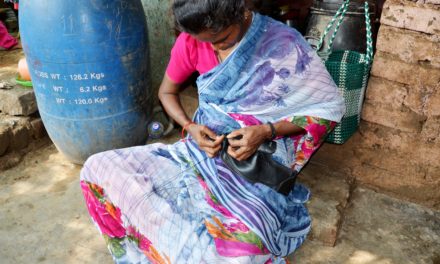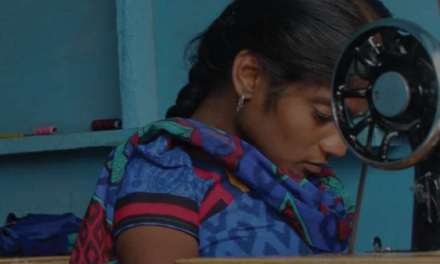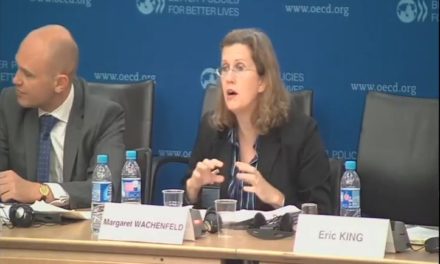A Glance Into The Lives Of Workers With Bite-Sized Stories From Factories, Homes & Communities
Health Warriors: Home-based workers employed in Ambur’s leather industry are making waves in the wake of a recent health awareness event organised by Cividep recently. The topics covered included state government health schemes for low-income families. Leveraging insights from the training, an engaged participant from Thuthipet village rallied approximately 30 fellow home-based workers to further spread the knowledge. Another encouraging development was when a group of these homeworkers visited the district CMCHIS (Chief Minister’s Comprehensive Health Insurance Scheme) office, eager to secure insurance cards. This grassroots effort signifies the potential for meaningful change through knowledge sharing and collaborative endeavors. (In pic: Homeworkers get to know about various government schemes)
Yet Another Outsourcing Boom? Garment workers and field staff have been reporting the increasing trend of factories opting to outsource stitching contracts to external workers. These piece-rate workers are churning out larger volumes in contrast to their formally employed counterparts. This trend has led to apprehension and unease among factory workers. Their concerns revolve around the potential of the company elevating the daily stitching quota to align with the heightened productivity of these contract workers. The evolving landscape brings both opportunities and challenges, prompting discussions on fair practices in setting daily work targets.
Women Not At Work: While Special Economic Zones (SEZs)* often showcase high number of women workers, a critical question remains: why is female labour force participation persistently low? A discussion at Cividep’s WRC in Sriperumbudur explored why women often face difficulties in earning a livelihood. Many participants highlighted factors such as marriage, childbearing, care responsibilities, and cultural norms as hurdles to both getting and keeping jobs. Interestingly, some voiced the possibility of transitioning to different roles after marriage. “My job might change but I will certainly find a new path post-marriage,” said a worker. The session explored topics such as mobility, workplace safety, lack of professional growth, and maternity leave. Prior to this, the participants took part in interactive activities – walking in diverse patterns and adopting alternate identities – to foster engagement and reflection.
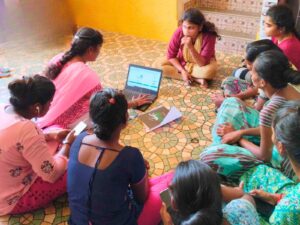 Leading The Way: Garment worker leaders in Bengaluru are stepping up to co-facilitate meetings and mobilise peers, in collaboration with Cividep’s partner organisations. Last month, 65 workers participated in 12 community gatherings that talked about labour rights, social security benefits, and working conditions. Conducted in key workers’ residential areas like Goraguntepalya and Mysore Road, these meetings served as important forums for workers to know more about various support systems. Many of them got to know about Worker Resource Centers (WRCs) run by partner organisations in various parts of the city. They were also encouraged to access Karnataka state government schemes such as Gruhalakshmi and Gruhajyothi, alongside social security entitlements such as pensions. Workers freely shared challenges, highlighted production pressures, and concerns about PF and ESI schemes, to which field officers provided guidance and solutions. Collaborative efforts between worker leaders and field teams seem to be fostering a more informed and empowered workforce.
Leading The Way: Garment worker leaders in Bengaluru are stepping up to co-facilitate meetings and mobilise peers, in collaboration with Cividep’s partner organisations. Last month, 65 workers participated in 12 community gatherings that talked about labour rights, social security benefits, and working conditions. Conducted in key workers’ residential areas like Goraguntepalya and Mysore Road, these meetings served as important forums for workers to know more about various support systems. Many of them got to know about Worker Resource Centers (WRCs) run by partner organisations in various parts of the city. They were also encouraged to access Karnataka state government schemes such as Gruhalakshmi and Gruhajyothi, alongside social security entitlements such as pensions. Workers freely shared challenges, highlighted production pressures, and concerns about PF and ESI schemes, to which field officers provided guidance and solutions. Collaborative efforts between worker leaders and field teams seem to be fostering a more informed and empowered workforce.
Quick Solutions: It is not uncommon among low-wage factory workers to be unaware of their basic entitlements such as Provident Fund (PF), pension, health insurance and so on. Unfamiliarity also leads to inaccessibility, as workers cannot verify whether their employers are contributing towards these entitlements. Cividep’s field staff at the electronics manufacturing hub of Sriperumbudur in Tamil Nadu regularly reach out to workers through awareness sessions on paid annual leave; entitled leave, and PF. (In pic: Field staff help workers with UAN activation.)
Health Matters: A recent research report by Cividep brought out the interconnectedness between gender and the occupational health and safety needs of garment workers, a majority of whom are women. Last month, the team took these lessons back to the garment workers, by organising a ‘Training of Trainers’ session for worker leaders and staff of partnering grassroots organisations. Learning facilitators ensured that workers grasped the connection between health and gender discrimination, as well as poor working conditions.
Topics included menstrual health, cervical cancer, nutrition, cost effective meal planning, ergonomics, and pelvic health. These leaders now advocate for healthy practices at work and promote open discussions about the same. The team plans to create information materials and video clips from the sessions to further spread health awareness.
*A special economic zone (SEZ) is an area designed to attract business investment, and often offers tax incentives and lower tariffs.
Updates: Pramod Kumar, Kaveri MT, Kohila Senbagam, Gokhularaj R.
Pictures: Nanthini, Elamathi, Soniya

